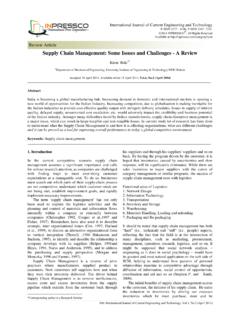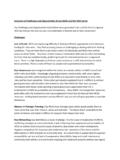Transcription of The Challenges Facing Management Today and Tomorrow
1 The Challenges Facing Management Today and TomorrowThe Challenges Facing Management Today and TomorrowNgige, Chigbo Challenges Facing Management TODAYAND TOMORROWN gige, Chigbo Odumegwu Ojukwu UniversityABSTRACTM anagement Challenges in the 21st century looksafresh at contemporary and the future ofmanagement thinking and practice. The Challenges revolves around two fundamental issues thatare occurring simultaneously; the changes in the world economy, and shifts in the practice ofmanagement. These developments both in developing and the developed countries are crucial inexploring and understanding the Challenges of the future. This paper focuses on the key questionsfor all organizations; what are the new Challenges or realities?
2 What new policies andmanagement responses are required of companies and executives in order to deal with thesechallenges. With this in mind, this paper offers a number of strategies-both proactive andotherwise-on how managers can respond or be more responsive to these Challenges facingmanagement Today and : Management , Knowledge,Workers, Outsourcing, GlobalizationINTRODUCTIONM anagement is a child of the last two centuries,that is, the 19thand 20thcenturies. During theearly part of the 20thcentury most Europeansand Asians, were still very skeptical aboutmanagement. For instance, when in 1924 MaryParker Follet gave a Management seminar at theOxford University, London, they cajoled herand made mockery of her,thinking that she isjust bringing to them another importantAmerican fad.
3 And in those years, thecommunist countries toowere quite certain thatmanagement was a capitalist invention whichhas absolutely no meaning for them-and wasindeed totally incompatible with anything thatcould be called Socialist or Marxist . Thesepeople and countries were still very skepticalabout Management then because it wassomething that fitted others, but had very littlerelevance to them, their own companies andinstitutions and their own countries. As socialinstitutions go ( in the early part of the 20thcentury), Management is thus a mere infant this child has been growing up very, veryfast.
4 Few people Today would doubt thatmanagement is essential. Indeed, even in China,where under Mao Management was clearlytaboo, there is now a sharp shift. Today , Management and managersare the essential keyresource for economic and social is a factor of production and aneconomic resource, and the arts and sciences ofmanagement appear to provide the bestopportunity for increase in productivity. Thevastmajority of productivity improvements(60%) are within the purview of assertive,innovative, entrepreneurial managersfunctioning in their role as productivity catalysts(Heizer and Render, 1991).
5 However, with this acceptance of managementas a key function in society have come ever-increasing demands/ Challenges on the , the Challenges Facing Management todayand Tomorrow illustrate the rapid change andunpredictability that all managers face Today incontemporary times and in the future. Mostorganizations have survived and thrived becauseof the remarkable Management talent of theirmanagers and Management . Hence, managersand Management can have the most remarkableeffects on organizations if they take intocognizance these issues/ Challenges facingmanagement Today and Tomorrow . Conversely,businesses with untrained and unrepentant staffto cope with these Challenges will lose marketshare and will ultimately be chased out of120 COOU InterdisciplinaryResearch JournalThe Challenges Facing Management Today and TomorrowEzeaku, Stella.
6 N., Ohamobi, Ifunaya . , Chigbo , Stella .N., Ohamobi, Ifunaya . ,Chigbo by their competitors. Nevertheless, theeffect of good Management in coping with thesechallenges on companies is nothing short Today thus need to grapple with anumber of revolutionary forces/ Challenges ;boosting the productivity of resources,employing resources where results are,stayingahead and coping with change/acceleratingproduct and technological changes, motivatingknowledge workers/disenchanted employees orrather trends towards knowledge workers andthe information age, and globalized like thesehave changed the playingfield on which firms must compete.
7 Inparticular, they have dramatically increased theneed for firms to be responsive, flexible, andcapable of competing and reacting rapidly in aglobal that in mind, it is against this backgroundthat this paper explores the Challenges facingmanagement Today and Tomorrow in order toidentify how managers can respond or be moreresponsive to these Challenges in order to drivetheir organizations toastellar OF BOOSTING/INCREASING THE PRODUCTIVITY OFRESOURCESThe Management challenge Today , andincreasingly the Management challenge oftomorrow will centre on boosting theproductivity of resources.
8 In nineteenth centuryliberal capitalism, it was believed that resourcesdeveloped themselves and are allocated by the invisible hand . In nineteenth centurysocialism and twentieth century communism, itis believed that the development of resources isa function of the system-which is another formof the invisible hand . We know better Today , in the 21stcentury. Resources are developedby managers, are allocated by managers andmanagers are responsible for their is above all productivity which is the firstmission of Management and its firstresponsibility. And the Management challengetoday, and increasingly the managementchallenge of Tomorrow will centre on theproductivity of are not made by nature.
9 They aremade by man. And this is particularly true oftwo key resources-the human being andcapital. Indeed, the human being as such is notresource. He becomes a resource only if trained,developed and allocated to productive is the central challenge of Management . Itis particularly important indevelopingcountries. It is the essence of being a developingcountry that effective , productive, competentpeople are in very short supply. One of thecentral Management Challenges in a developingcountry is development of people into humanresource-atask of training, of developing, many ways, capital is perhaps even morecrucial, especially in developing countries, thanthe human resource.
10 And capital can only beobtained by providing a surplus from Today sproduction over Today s costs-otherwise,capital formation cannot take place. Capitalformation may be the crucial factor in thedevelopment of the developing countries. It isalso the crucial factor in the continuingprosperity of the developed this regard, everyone knows that there are nojobs unless we can invest in substantial amountof capital. Even in developing countries, inwhich a good deal of activity is, and should be,labour intensive, the capital cost of a new job isvery high and is going up rapidly. Infact, youmay well say that the greatest drawback, thegreatest weakness and thus the greatestchallenge of developing countries in theirdesperate search for employment opportunities,is lack of enough capital to create jobs (Drucker,2001).







